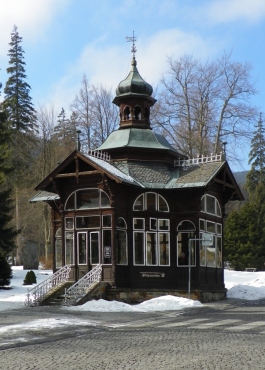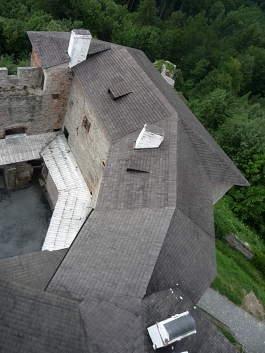
The German Order requested, among other things, Bouzov, Sovinec, and Karlova Studánka
 |
| Drinking pavilion in Karlova Studánka |
If the property is restored, it will, according to Černý, be used for the further development of the order's activities in the Czech territory, particularly in the fields of education, charity, and social services, as well as in spiritual administration.
Apart from Bouzov, Sovinec, and the spa Karlova Studánka, the order is also seeking the Grandmaster's House in Opava, the church in Karlova Studánka, the former poorhouse in Bruntál, part of the convent in Opava, and the Bruntál Castle. Černý told ČTK that regarding the spa Karlova Studánka, the order is requesting "the entire complex except for a few properties."
Bouzov and the house in Opava are currently managed by the National Heritage Institute. Director of the institute Naďa Goryczková does not want to speculate on whether the properties could be restored. "The request consists of hundreds of pages; we received it today. Since the NPÚ is a state-funded organization, legitimate parties must always prove that the property served spiritual, pastoral, charitable, health, educational, or administrative purposes, or as residences for clergy during the relevant period. If this cannot be proven, we will forward the request for our founder's assessment," she said to ČTK today. The residential house in Opava is used by a detached workplace of the NPÚ in Ostrava, so it is not accessible to the public.
The NPÚ has recorded a total of ten challenges from various churches regarding the restitution of property, including claims for the Porta Coeli Monastery in Předklášteří, the Sázava Monastery, the Týniště Castle, and the castle in Žďár nad Sázavou. Among the heritage sites the church is requesting is also the Church of St. John of Nepomuk on Zelená Hora, which is listed on the UNESCO World Heritage List and for which the Brno Diocese is making the request.
The law on property settlement was approved by Parliament in the previous electoral term. It provides for the return of real estate valued at approximately 75 billion to the churches from the state. The legislation has been the subject of disputes in recent years and has become one of the topics in the electoral campaign. Apart from the ČSSD, the communists demand amendments to the law approved by the former coalition of ODS, TOP 09, and LIDEM. The chairman of the ANO 2011 movement, Andrej Babiš, criticized the inflation clause related to restitutions. For instance, the Christian Democrats, with whom the ČSSD and ANO 2011 are negotiating a possible government collaboration, oppose interventions in the method of property settlement with churches.
 |
| Roofs in Sovinec |
The vicar of the grandmaster of the order, Metoděj Hofman, stated in a statement that Černý provided to ČTK that since the rise of fascism in Germany, the order and its representatives have opposed German expansionist policy and engaged in activities aimed at preserving the integrity and sovereignty of Czechoslovakia. "A direct consequence of the order's loyalty to the Republic of Czechoslovakia was its dissolution and the confiscation of its property, specifically on February 27, 1939, by decree of the Reich Commissioner for Sudeten German areas," he wrote.
According to him, the order wants back properties that it owned before World War II and that were confiscated by the Nazi government. "In 1945, this property was returned to the order under decree no. 5 of the Republic's president, and it was agreed that it be placed under national administration, which managed the property until 1951, with the order's cooperation. This indicates that the order was the owner of the properties it is claiming as of February 25, 1948," Hofman added.
When the issue of returning church property was discussed in the Chamber of Deputies in the 1990s, some legislators talked about materials suggesting that some members of the order had collaborated with the Nazi regime.
Jaroslav Šebek from the Historical Institute of the Academy of Sciences said today on Radiožurnál that he was surprised by the order's request, especially at this "tense time" when church restitutions have become a topic in political negotiations about the future government. He noted that a potential return of the properties could shift the restitution boundary before February 1948 even closer to 1945, "which is unacceptable." "Personally, I believe it is more likely that the order will not receive these properties," he said.
Regarding the order's argument that the confiscation based on the Benes decrees was flawed from the outset and could not have occurred, he stated that the legal irregularities around this property were known earlier. "However, it was more or less expected that the property of the Order of Teutonic Knights would not be included in this law on property settlement with churches and that it would be discussed perhaps in a special law based on other legal opinions, but certainly not at this moment," he added. In this case, he noted, it is indeed not legally clear whether the order owned the property on February 25, 1948.
The Catholic Church also commented on the Teutonic Order. "The Catholic Church fully recognizes the boundary of February 25, 1948, as established in the law on property settlement with churches and religious societies. We expect the state to ensure a proper examination of the requests so that this boundary is not breached," stated Tomáš Holub, the general secretary of the Czech Bishops' Conference, to ČTK.
The Order of Teutonic Knights was founded in 1190 in Acre, a port city in present-day Israel, as a hospital brotherhood. From 1204 onwards, at the invitation and request of Czech King Přemysl Otakar I, it began operating in some towns and places in the territory of today’s Czech Republic. Today, according to Černý, it operates the Church Grammar School of the Teutonic Order in Olomouc, a leisure center in Olomouc, the Church Conservatory in Opava, and the Care Service of the Teutonic Order in Bruntál.
The English translation is powered by AI tool. Switch to Czech to view the original text source.
0 comments
add comment
Related articles
0
12.07.2023 | The Constitutional Court rejected the complaint of the German Order, the land at Bouzov remains with the state
0
20.09.2019 | Bouzov will remain with the state, the Constitutional Court rejected the complaint of the German Order
0
24.07.2017 | Sport about the Bouzov State Castle is heading to the Supreme Court due to an appeal
0
30.03.2017 | Bouzov belongs to the state, the appellate court confirmed the dismissal of the order's lawsuit
0
22.08.2016 | The Olomouc court should decide the dispute over the return of Bouzov Castle
0
14.06.2016 | The German Order is seeking the return of Bouzov Castle in court
0
18.05.2016 | The Heritage Institute returned part of the Sázava Monastery to the church
0
16.11.2013 | The order has no claim to Bouzov and other property, said the deputy minister











